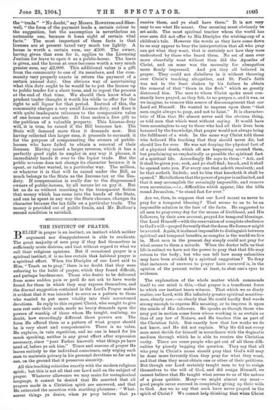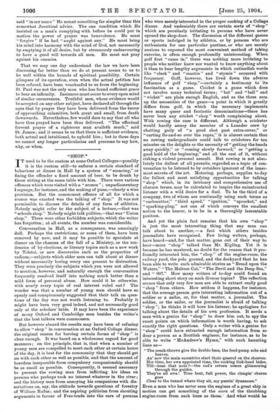B ELIEF in prayer is an instinct, an instinct which neither
argument nor disappointment is able to eradicate. The great majority of men pray if they find themselves in sufficiently acute distress, and that without regard to what we call their religious opinions. But if occasional prayer is a spiritual instinct, it is no less certain that habitual prayer is a spiritual effort. When the Disciples of our Lord said to Him, "Teach us to pray," there is no doubt that they were referring to the habit of prayer, which they found difficult, and perhaps burdensome. Those who desire to be delivered from some sudden pain or peril do not ask to have words found for them in which they may express themselves, and the diurnal suggestion contained in the Lord's Prayer makes it evident that it was intended to serve as a pattern to those who wanted to put more vitality into their accustomed devotions. In reply to this request Christ, who sought to give men rest unto their souls, made no heavy demands upon the powers of worship of those whom He taught, realising, no doubt, bow exceedingly different those powers are. The form He offered them as a pattern of what prayer should be is very short and comprehensive. There is no value, He explains, in vain repetition, and no one is heard for his much speaking, neither is any great effort after expression necessary, since "your Father knoweth what things ye have need of, before ye ask him." Times and seasons of prayer He leaves entirely to the individual conscience, only urging each man to maintain privacy in his personal devotions so far as he can, on the ground that it preserves sincerity.
All this teaching coincides exactly with the modern religious spirit; but this is not all that our Lord said on the subject of prayer. Whatever allowance we may make for metaphorical language, it cannot be denied that He asserted that all prayers made in a Christian spirit are answered, and that He reiterated the assertion with startling plainness : " What- soever things ye desire, when ye pray believe that ye
receive them, and ye shall have them." It is not very easy to see what He meant. One meaning must obviously be set aside. The most spiritual' teacher whom the world has ever seen did not offer to His Disciples the wishing-cap of a children's tale. However the words as they have come down to us may appear to bear the interpretation that all who pray can get what they want, that is certainly not how they were understood by those who heard them. No set of men ever more cheerfully went without than did the Apostles of Christ, and on none was the necessity for abnegation more firmly impressed. And yet they all believed in prayer. They could not disbelieve in it without throwing over Christ's teaching altogether, and St. Paul's faith was not in the least shaken by his failure to obtain the removal of that "thorn in the flesh" which so greatly distressed him. The men to whom Christ spoke must con- stantly have prayed, as they felt, to no purpos e, and it was, as we imagine, to remove this source of discouragement that our Lord set Himself. He wanted to impress upon them "that men ought always to pray, and not to faint." It is character- istic of Him that He almost never said the obvious thing, or told men that which went without saying. It would have been meaningless to say to those who had all their lives been harassed by the knowledge, that prayer would not always bring the fulfilment of a wish. In the same way Christ told those who believed His teaching that they should never die, but should live for ever. He was not denying the physical fact of of a physical death, which all saw happening around them, but proclaiming as emphatically as possible the spiritual fact of a spiritual life. Accordingly He says to them: "Ask, and it shall be given you; seek, and ye shall find; knock, and it shall be opened unto you. For every one that asketh receiveth; and he that seeketh findeth; and to him that knocketh it shall be opened." He tells them that the power of prayer is unlimited, and that it may accomplish the seemingly impossible, and remove even mountaius,—i.e., difficulties which appear, like the hills round Jerusalem, "to stand fast for ever."
Are we, then, to suppose that our Lord meant us never to pray for a temporal blessing ? That seems to us to be an impossible solution in the face of the facts. He suggested to all men to pray every day for the means of livelihood, and His followers, by their own account, prayed for temporal blessings. Our Lord Himself—with the reservation of complete obedience to God's will—prayed fervently that the doom He foresaw might be averted. Again, it is almost impossible to distinguish between spiritual and temporal benefits, so complex is the world we live in. Most men in the present day simply could not pray for what seems to them a miracle. When the doctor tells us that life is extinct we have not the power to pray that that life may return to the body ; but who can tell how many calamities may have been avoided by a spiritual suggestion ? To deny that instances of answers to prayer have occurred is, in the opinion of the present writer at least, to shut one's eyes to evidence.
The explanation of the whole matter which commends itself to our mind is this,—that prayer is a beneficent force to which our instinct bears witness. That which we so dimly realise, our Lord, with His infinitely greater spiritual sensitive- ness, clearly saw,—so clearly that He could hardly find words strong enough to express His meaning, or to impress it upon the minds of His followers. He speaks as though those who pray put in motion some force whose working is as certain as that of any law of Nature, and He teaches this as part of the Christian faith. But exactly how that law works we do not know, and He did not explain. Why He did not every man must decide for himself in accordance with the dogmatic medium through which he is able to receive the Christian verity. There are some people who get out of all these diffi- culties by piously begging the question. They say that all who pray in Christ's name should pray that God's will may be done more fervently than they pray for what they want, and that then they must obtain one or other of their petitions. But though our Lord certainly taught men to try to resign themselves to the will of God, and did resign Himself, we cannot believe that He taught what seems to us of the nature of a pious quibble. Many—we might almost say most— good people never succeed in completely giving up their. wills to God. Are we to say that such have never prayed in the spirit of Christ ? We cannot help thinking that when Christ
said "in in* name" He meant' something far simpler than this .somewhat Jesuitical advice. The one condition which He insisted on a man's complying with before he could' put' in motion the power of prayer was benevolence. He mist '" forgive " if he had "aught against any." He must bring his mind into harmony with the mind of God, not necessarily by emptying it of all desire, but by strenuously endeavouring to have a good will towards all men. He must not pray • against his enemies.
That we may one day understand the law we have been discussing far better than we do at present seems to us to be well within the bounds of spiritual possibility. Certain glimpses of its operation, even when the actual petition has been refused, have been vouchsafed to us from the beginning. St. Paul was not the only man who has found sufficient grace to bear an infirmity. Instances must occur to every open mind of similar occurrences. Truthful men, whose evidence would be accepted on any other subject, have declared all through the ages that by prayer they have been delivered from the terror of approaching calamities, both great and small, from death downwards. Nevertheless, few would dare to say that all who have thus prayed have been thus delivered. ",The effectual fervent prayer of a righteous man availeth much," said St. James ; and it seems to us that.there is sufficient evidence, both actual and intuitional, to uphold him ; but in these days aye cannot any longer particularise and presume to say how, why, or when.
"SHOP."



























































 Previous page
Previous page